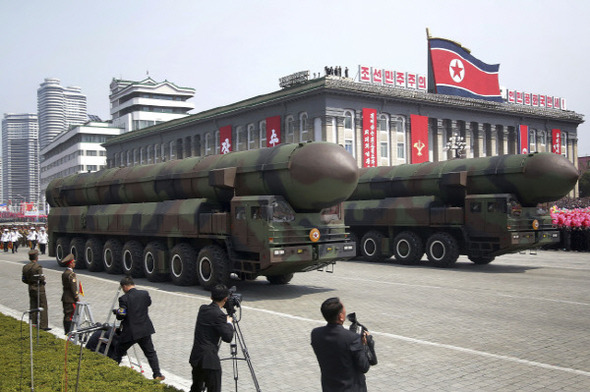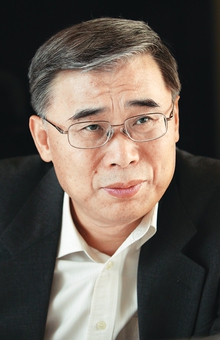 |
|
The North Korean military parades two ICBMs through Kim Il-Sung square in Pyongyang on the 105th anniversary of his Kim’s birth on April 15, 2017. A similar parade scheduled to take place on Feb. 8 is drawing concerns that it could cast a chill over the Pyeongchang Olympics. (Hankyoreh Archive)
|
Concerns rise that North Korea will use the event to cast a chill on the Pyeongchang Olympics
North Korea’s decision to move the celebration of the founding of the Korean People’s Army (KPA) to Feb. 8, one day before the Pyeongchang Winter Olympics is set to begin, has thrown South Korean society into turmoil. Some argue that North Korea changed the date to cast a chill on the Pyeongchang Olympics and predict that the North will carry out provocative behavior during the event, such as holding a parade of nuclear weapons and missiles. Such behavior would seriously undermine North Korean leader Kim Jong-un’s declaration that he “sincerely” hopes that the Pyeongchang Olympics will be a success. While we cannot know in advance how North Korea will organize the event on Feb. 8, what is clear is that the rescheduling of military foundation day is not connected with the Pyeongchang Olympics. The KPA’s original foundation day was Feb. 8, 1948. But in 1978, North Korean founder Kim Il-sung moved foundation day to Apr. 25, 1932, which is the date when he organized the Anti-Japanese People's Guerrilla Army (in North Korea, called the Korean People’s Revolutionary Army) in Antu County, China, during his youth. This was designed to back up the claim that Kim turned this group of guerrillas into a regular revolutionary army and eventually the KPA after Korea’s liberation from Japanese control. In 1996, Apr. 25 was even declared an official state holiday. But in 2015, North Korea reinstated Feb. 8 on the list of national holidays and began celebrating it once again as the date of the “foundation of the regular revolutionary military.” In line with that, the date has again been officially declared to be the military foundation day this year, which is its 70th anniversary. Whatever the circumstances, there are increasing concerns that this will result in the North Korean military holding a big parade on the very eve of the Pyeongchang Olympics. At the same time, Kim Jong-un’s bellicose image has been stamped on our minds once again. The ironic thing is that, in the eyes of an expert, the change of North Korea’s military foundation date epitomizes Kim Jong-un’s pragmatic style of rule. During the 1970s, Kim Jong-il, who had been chosen to succeed his father Kim Il-sung, organized a stilted campaign to shift historical and institutional starting points to the period of resistance against Japanese colonial rule, centered on the elder Kim. That was when the military foundation day was altered to Apr. 25, 1932. These things happened at a time when Juche Thought had been carried to the extreme and the cult of personality around Kim Il-sung had reached its zenith. Attempts to make North Korea a normal country The irrational elements that crept into North Korea’s institutions at this time still survive in various places, protected by the impregnable armor of the “revolutionary tradition.” The adjustment of the military foundation date shows that Kim Jong-un is taking down the sacred cows created by his father and grandfather. This can be read as an attempt to make the North a normal country. In fact, a closer look at North Korean society shows numerous signs of Kim Jong-un’s pragmatism. Whereas Kim Jong-il had brandished the slogan of a “great and powerful country” before his hungry people, for example, Kim Jong-un has dialed the rhetoric back to a “powerful country.” Whereas Kim Jong-il created a bubble in the military brass by appointing too many top generals, Kim Jong-un has popped that bubble by demoting many of them. The younger Kim has also opened up the economy and encouraged farmers to expand their output by introducing a system of competitive production. While a purge of senior officials normally spells the end for their pet projects, Kim Jong-un retained the policy of economic openness spearheaded by his uncle Jang Sung-thaek even after ordering Jang’s execution. A pragmatic warmonger From an observer’s perspective, Kim Jong-un seems less of a dyed-in-the-wool warmonger than one who has chosen a strategy of warmongering for its pragmatic benefits. If that’s true, there may be some way to exploit the pragmatism that lies behind his bellicosity. If Kim has clung to his development of nuclear weapons for the pragmatic reason of guaranteeing the security of his regime, it occurs to me that he might make the opposite choice if he were confident of receiving a security guarantee for his regime from the US. Importantly, he has already consolidated power, which was another objective of his nuclear weapon development. At the same time, the economic development he seeks is blocked by sanctions. When North Korea launched the Hwasong-15 intercontinental ballistic missile (ICBM) at the end of November of last year, it declared the “completion” of its state nuclear force. But experts have generally said that the North would need to carry out additional test launches to actually complete its ICBM development. The North’s official pronouncements have mostly been consistent with its progress in nuclear weapon and missile development. So why would North Korea have been mistaken about declaring the completion of its nuclear force this time?
 |
|
Lee Jong-seok, former Unification Minister
|







